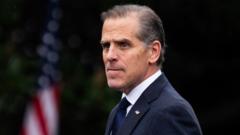As the deadline approaches, Canada asserts its commitment to protecting its industries amidst US tariff threats.
Canada Stands Firm Against 'Bad Deal' on US Tariffs, Says Prime Minister Carney

Canada Stands Firm Against 'Bad Deal' on US Tariffs, Says Prime Minister Carney
Prime Minister Carney emphasizes the need for a favorable trade agreement with the US ahead of impending tariffs.
Canadian Prime Minister Mark Carney has made it clear that Canada is not willing to agree to a "bad deal" merely to finalize a trade agreement with the United States, as new tariffs loom with a set deadline of August 1. In statements made to reporters in Ontario, Carney emphasized the importance of prioritizing Canadian interests over hastily concluding a deal, explaining, “Our objective is not to reach a deal whatever the cost.”
The stakes are high, as failure to secure an agreement by the deadline will result in US importers facing a whopping 35% tariff on Canadian goods. Historically, Canada and the United States have been key trading partners, but the recent administration changes and subsequent tariff initiatives from President Donald Trump have caused significant friction in their trade relations. Trump’s stance aims to revitalize American manufacturing and protect domestic jobs, but many analysts warn that these tariffs could lead to increased prices for US consumers and disrupt the global economic landscape.
Currently, Trump has sanctioned a 25% tariff on certain Canadian imports, alongside a substantial 50% tariff on aluminum and steel. In light of these developments, Prime Minister Carney hinted at the potential for protective measures aimed at supporting key Canadian industries faced with turbulence due to US tariffs, specifically targeting aluminum and lumber sectors. He mentioned the possibility of further intervention to assist those adversely affected, acknowledging the reality that “in the next couple of months... we'll see other needs for support for the sectors that have been the most affected."
With approximately 75% of Canadian exports directed to the US, industries ranging from oil and automobiles to food and pharmaceuticals stand to feel the impact of escalating tariffs. According to the US Trade Representative's office, in 2024, the US exported nearly $350 billion worth of goods to Canada while importing over $412 billion, underscoring the interdependent economic relationship shared by the two nations.
Trump's broader tariff program has been justified as a move against what he perceives as inequitable trade practices, challenging foreign partners to address issues including the illegal shipment of fentanyl into the US. Despite claiming to target unfair practices, critics point out that only a small fraction of fentanyl seizures occur at the Canada-US border, with the majority taking place at the US-Mexico border. Though Trump has outlined several agreements with other nations amid these tariff initiatives, including with the UK and Japan, many of these arrangements maintain higher tariffs than before. As discussions continue, Canada's stance remains resolute in seeking a fair and beneficial outcome for its own economy.



















